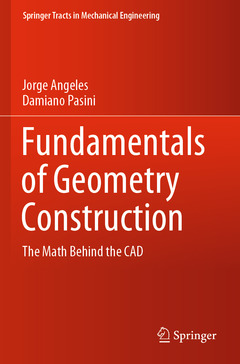Description
Fundamentals of Geometry Construction, 1st ed. 2020
The Math Behind the CAD
Springer Tracts in Mechanical Engineering Series
Language: English
Subject for Fundamentals of Geometry Construction:
Publication date: 04-2021
Support: Print on demand
Publication date: 04-2020
168 p. · 15.5x23.5 cm · Hardback
Description
/li>Contents
/li>Biography
/li>Comment
/li>
The textbook provides both beginner and experienced CAD users with the math behind the CAD. The geometry tools introduced here help the reader exploit commercial CAD software to its fullest extent. In fact, the book enables the reader to go beyond what CAD software packages offer in their menus.
Chapter 1 summarizes the basic Linear and Vector Algebra pertinent to vectors in 3D, with some novelties: the 2D form of the vector product and the manipulation of ?larger" matrices and vectors by means of block-partitioning of larger arrays. In chapter 2 the relations among points, lines and curves in the plane are revised accordingly; the difference between curves representing functions and their geometric counterparts is emphasized. Geometric objects in 3D, namely, points, planes, lines and surfaces are the subject of chapter 3; of the latter, only quadrics are studied, to keep the discussion at an elementary level, but the interested reader is guided to the literature on splines. The concept of affine transformations, at the core of CAD software, is introduced in chapter 4, which includes applications of these transformations to the synthesis of curves and surfaces that would be extremely cumbersome to produce otherwise.
The book, catering to various disciplines such as engineering, graphic design, animation and architecture, is kept discipline-independent, while including examples of interest to the various disciplines. Furthermore, the book can be an invaluable complement to undergraduate lectures on CAD.Includes exercises at the end of each chapter
Topics and items usually left out in undergraduate math courses are brought into the
Provides a few suggested readings for the benefit of instructors and students
These books may interest you

3D CADPrinciples and Applications 110.76 €



